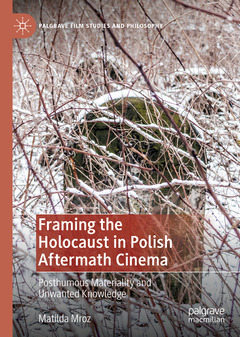Framing the Holocaust in Polish Aftermath Cinema, 1st ed. 2020 Posthumous Materiality and Unwanted Knowledge Palgrave Film Studies and Philosophy Series
Auteur : Mroz Matilda

This book offers a unique perspective on contemporary Polish cinema?s engagement with histories of Polish violence against their Jewish neighbours during the Holocaust. Moving beyond conventional studies of historical representation on screen, the book considers how cinema reframes the unwanted knowledge of violence in its aftermaths. The book draws on Derridean hauntology, Didi-Huberman?s confrontations with art images, Levinasian ethics and anamorphosis to examine cinematic reconfigurations of histories and memories that are vulnerable to evasion and formlessness. Innovative analyses of Birthplace (?ozi?ski, 1992), It Looks Pretty From a Distance (Sasnal, 2011), Aftermath (Pasikowski, 2012), and Ida (Pawlikowski, 2013) explore how their rural filmic landscapes are predicated on the radical exclusion of Jewish neighbours, prompting archaeological processes of exhumation. Arguing that the distressing materiality of decomposition disturbs cinematic composition, the book examines how Poland?s aftermath cinema attempts to recompose itself through form and narrative as it faces Polish complicity in Jewish death.
Provides an innovative account of how Polish cinema is responding to new histories of the Holocaust, as Polish perpetration, bystanding and witnessing in rural and provincial spaces is being reconceived.
Conducts original close readings of key Polish films via theoretical and film-philosophical frameworks to reconsider ethical and epistemological questions arising from film form, narrative and genre.
Forges a new approach to a ‘posthumous ecology’, interconnecting the material remains of Jewish victims, the natural environment, archaeological processes of exhumation, and their aesthetic rendering through cinema.
Date de parution : 02-2022
Ouvrage de 298 p.
14.8x21 cm
Disponible chez l'éditeur (délai d'approvisionnement : 15 jours).
Prix indicatif 126,59 €
Ajouter au panierDate de parution : 02-2021
Ouvrage de 298 p.
14.8x21 cm
Disponible chez l'éditeur (délai d'approvisionnement : 15 jours).
Prix indicatif 126,59 €
Ajouter au panier


